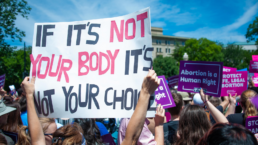As abortion access dwindles, America’s “parental-involvement” laws place further restrictions on teenagers — who may need to ask judges for permission to end their pregnancies.
By Lizzie Presser, ProPublica
On a hot Texas morning in 2020, Giselle, who goes by G, slipped her arms into a borrowed blazer, flipped up the nose ring in her septum so it couldn’t be seen and walked into the Coryell County Courthouse. It was the first time she had ever been to court. She was 17, 11 weeks pregnant and already beginning to show. She was going to ask a judge for authorization to seek an abortion. Her lawyer had explained that she needed to prove that she was mature enough to make this decision. G squeezed her lips around her braces, reminding herself not to smile. She didn’t want the judge to see her as a child.

Because G was a minor, her access to an abortion was governed by the state’s “parental involvement” law. She could have either notified her mother or father and gotten consent, or she could have filed a petition in her home county, asking for what’s known as a judicial-bypass hearing. She had chosen to petition. In the carpeted courtroom, G explained that she didn’t know her father, who was investigated by Child Protective Services after being accused of molesting her when she was a toddler. Though the case was inconclusive and he denies abusing her, he eventually gave up his parental rights. G didn’t trust her mother, whom she viewed as unreliable and volatile. They had bounced among houses and boyfriends for stretches of G’s life. A year before, G packed up her things and left.
When she discovered she was pregnant, she traveled to an abortion clinic in Austin, about 60 miles south of where she lived in Copperas Cove, a city of 37,000 where nearly everyone works on Fort Hood, the nearby military base. The clinic referred her to Jane’s Due Process, an organization that helps minors navigate judicial bypass. Ten days later, its staff found G a trained attorney. It took G a week to schedule a ride to meet with the lawyer, who asked about her grades, extracurricular activities, babysitting experience and which birth control method she would use in the future. Then, before her court date was scheduled, the District Court judge assigned to the case recused himself. Although he didn’t say why, many judges choose not to take a case in which they might have to approve an abortion. The clerk needed to book a visiting judge. Altogether, G had spent four weeks trying to get a hearing. And now, on June 18, 2020, four months shy of her 18th birthday, G knew that her future was at this judge’s discretion.
Recent Posts
All Democratic Presidential Candidates In 2028 Should Commit To Dismantling ICE
January 8, 2026
Take Action Now Since its inception, ICE has been designed to conflate issues of immigration with terrorist threats against the U.S.By Sam…
Trump Cuts Billions In Federal Childcare Funds For Democratic-Led States After Minnesota Fraud Scandal
January 8, 2026
Take Action Now Administration cites welfare fraud allegations as advocates and state leaders warn of political retaliation and sweeping harm to…
After The ICE Killing In Minneapolis, Will Truth Prevail?
January 8, 2026
Take Action Now Can Trump and Kristi Noem maintain their blatant lies in the face of multiple videos that show the victim was trying to drive away…
Venezuela And The Long Shadow Of The Monroe Doctrine
January 7, 2026
Take Action Now Critical historians like William Appleman Williams played a key role in highlighting the US’s imperial record in Latin America. Now…




